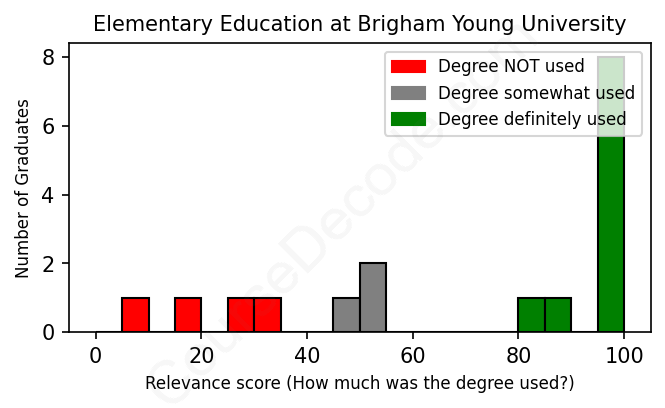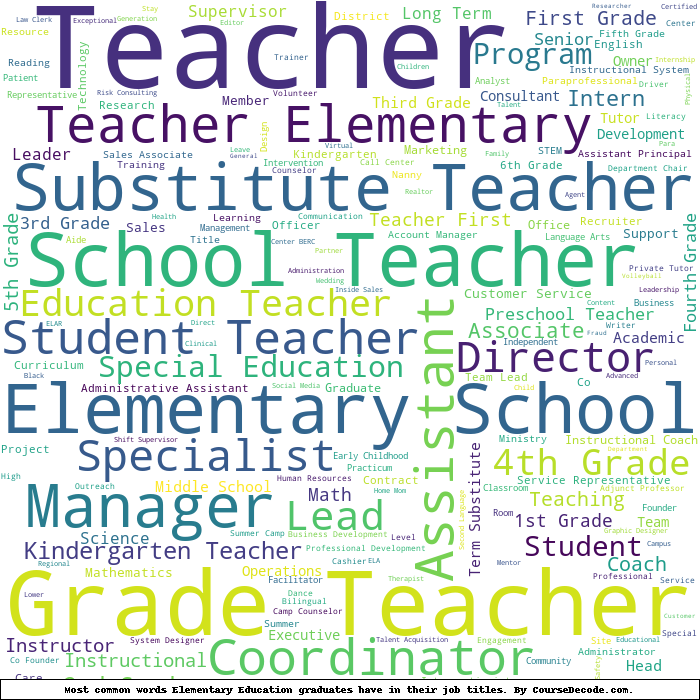
First, some facts. Of the Elementary Education graduates from Brigham Young University we've analyzed , here's how many have used (or NOT used) their degree in their career:

These are estimates based on AI analysis of 17 LinkedIn profiles (see below).
The verdict? Slightly above average. Overall, with an average relevance score of 70%, Elementary Education graduates from Brigham Young University have a slightly higher likelihood (+3%) of finding work in this field compared to the average graduate across all fields:
And for comparison, here's the chart for all profiles we've looked at across all degrees.
Also, after graduating, only 29% of these graduates have pursued further education other than another Bachelor's degree (such as a Masters degree or other), compared to the average across all profiles of 35%. This suggests a Bachelors degree is enough for most Elementary Education graduates, and it's normal to look for work straight after graduation.
See the details:
|
Relevance score: 98% We think this person has gone into a career highly relevant to their degree. We think this person has gone into a career highly relevant to their degree.
DEGREE INFOGraduated in 2016 from Brigham Young University with a Bachelors Degree in Elementary Education. No other secondary education since. JOB HISTORY SINCE GRADUATIONSubstitute Teacher Kelly Services Apr 2016 - Aug 2016 Claims Agent  DishOne Jun 2016 - Aug 2016 Assistant Preschool Teacher  Alpine School District Sep 2016 - Present ABOUTNo information provided. |
The top 10 most common jobs done by the graduates we've analyzed (ranked most common to least) are:
Here is a visual representation of the most common words in job titles for Elementary Education graduates (this is across all Elementary Education graduates we've analyzed, not just those who went to Brigham Young University):

So, when you look at the career trajectories of people who graduated with a degree in Elementary Education from Brigham Young University, there are definitely some interesting trends. For a lot of these graduates, their first job right out of college tends to be as an elementary school teacher. It makes sense, considering that’s what they studied for! A good number of them stuck to teaching, and several have continued in that path for several years or even built into roles like curriculum developers or school administrators. For instance, some grads who started as teachers became principals and vice principals as they gained more experience, which shows a clear upward trajectory in the education field.
On the flip side, there are also some graduates who've ventured away from traditional teaching roles after a while, like moving into executive assistant positions or even completely different fields like real estate. This variety can indicate that while many people find long-term careers in education, others might explore different opportunities that leverage their skills in other areas. Overall, it seems like most graduates have found ways to utilize their education degree, whether that’s directly in teaching or in roles that still connect to their initial career paths. So, if you’re considering this major, it looks like there are plenty of opportunities both in and outside of the classroom as you progress through your career!
Getting a Bachelor’s degree in Elementary Education at Brigham Young University is generally quite manageable, especially if you're passionate about teaching and enjoy working with kids. The coursework covers a mix of education theory, child development, and hands-on teaching methods, which can be super engaging if you like practical applications rather than just textbooks. While it can be challenging at times—especially with things like lesson planning and classroom management—it’s not as intense as some other majors. So, if you've got a genuine interest in education and are willing to put in the effort, you’ll likely find it to be a rewarding experience that’s just the right level of tough without being overwhelming.
Most commonly, in the LinkedIn profiles we've looked at, it takes people 5 years to finish a Bachelor degree in Elementary Education.
Looking at the careers these BYU Elementary Education graduates have taken, it seems like they generally followed paths that may not be the highest-paying, especially those who stuck with teaching roles. Many of them have transitioned to other positions that could offer better salaries, like HR-related jobs or administrative roles, but there are still a few sticking to teaching. The ones who have moved into specialized roles like employee engagement or real estate likely have the potential to earn decent money, especially after gaining experience. So, while some may be doing alright, it seems like a mix of folks might still be on the lower end of the earnings scale, especially those who stayed in teaching. Overall, it looks like they might be getting by, but "making it rich" might not be in the cards for everyone just yet!
Here is a visual representation of the most common words seen in the "about" section of LinkedIn profiles who have a Bachelor degree in Elementary Education (this is across all Elementary Education graduates we've analyzed, not just those who went to Brigham Young University). This may or may not be useful:

Here are all colleges offering a Bachelor degree in Elementary Education (ordered by the average relevance score of their Elementary Education graduates, best to worst) where we have analyzed at least 10 of their graduates: